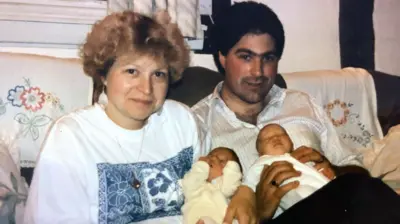We've updated our Privacy and Cookies Policy
We've made some important changes to our Privacy and Cookies Policy and we want you to know what this means for you and your data.
Can you be 'dead' for 78 minutes?
- Author, Nick Triggle
- Role, Health correspondent, ΒιΆΉΤΌΕΔ News
The more details that emerge about Fabrice Muamba, the more amazing his story becomes.
The latest has seen the Bolton footballer labelled the "miracle man".
The 23-year-old collapsed on the pitch during the FA Cup tie against Tottenham at 18:13 GMT on Saturday, but it was not until 19:31 that his heart started working again.
He was - according to Bolton's club doctor - "in effect dead" during that 78 minutes.
But how is this possible?
The full details of what happened to him have yet to emerge.
But the most likely explanation - and one suggested by those involved in his care - is that while his heart stopped working, it retained some form of life.
The cardiac arrest he suffered meant his heart was not contracting and therefore pumping blood around his body.
However, even when this happens, some electrical activity can still be taking place within the heart.
If this was the case, one of several things could have been happening.
The heart could have developed a severely abnormal rhythm, known as either ventricular fibrillation - where it shakes like a jelly - or ventricular tachycardia - where it is out of control.
The third explanation is that it has developed pulse-less electrical activity whereby there is an organised rhythm but no heart contractions.
In some cases, the state of the activity can interchange between the three.
The important thing in such cases is to start CPR quickly.
This artificially pumps the blood round the body, buying medics time to work out how to get the heart working properly.
Every minute delay in starting CPR reduces the chances of survival by 10%.
In this respect, the 23-year-old was lucky.
Pitch-side at White Hart Lane were a team of fully-trained and equipped medics.
What is more, a cardiologist was in the crowd and was soon by Muamba's side lending help.
It meant he received almost immediate attention.
But CPR alone is not enough. That only gives someone suffering a cardiac arrest a 5% chance of survival.
While he lay stricken on the pitch, the footballer was given oxygen and three shocks using a defibrillator.
The aim of that is to try to get the heart working again.
He was soon transferred to a waiting ambulance and rushed off to hospital.
In total he received another 12 shocks before his heart started working properly.
But was he really dead?
Clearly not in the technical sense - although his life was obviously in the balance.
Some people flatline following a cardiac arrest, which means they do not have any activity in the heart.
These cases are very hard to resuscitate people from.
But, instead, with some signs of a rhythm medics kept persisting.
In fact, experts say that even doing this for as long as they did for Muamba is not that unusual.
Cathy Ross, of the British Heart Foundation, explains: "Performing CPR early buys the time necessary. Seventy-eight minutes is a long time, but it's not unheard of."
If you want to find out how you could help someone who has a cardiac arrest, the British Heart Foundation runs a training course called .
Top Stories
More to explore
Most read
Content is not available








